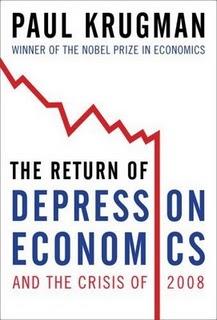The Return of Depression Economics

Paul Krugman's The Return of Depression Economics is one of the most accessible reads on the current financial crisis. The 2008 winner of the Nobel Prize in Economics successfully avoids jargon in presenting a smart, interesting take on global financial crises in the 1990s. Originally published ten years ago, Krugman updated it to reflect current events.
In The Return of Depression Economics, Krugman mainly places blame on leveraged credit, which substantially increased risks associated with investment. He chronicles the creation of “shadow banks,” secondary institutions that provide unregulated monetary advances, and intelligently refutes those polemics who would state the financial crisis has no immediate precedent. Krugman plainly examines smaller yet similar meltdowns in Latin America and Asia.
Those without a background in economics or international studies can understand the scale of the crisis encountered in 2008. Krugman states a number of recommendations for policy makers. He says, “What the world needs right now is a rescue operation. The global credit system is in a state of paralysis, and a global slump is building momentum. Reform of the weaknesses that made this crisis possible is essential, but it can wait a little while.” For the immediate future, he advocates increasing spending, reviving credit, and essentially introducing legislation for a “new regulatory regime.”
Consistently, Krugman manages to engage the reader. In describing the vicious cycle of the economic meltdown, he uses a self-described “whimsical” example of a baby-sitting cooperative to explain the effects of a recession. Krugman does, however, underscore the gravity of the subjects he discusses. He states: “Fifteen years ago hardly anybody thought that modern nations would be forced to endure bone-crushing recessions for fear of currency speculators, and that major advanced nations would find themselves persistently unable to generate enough spending to keep their workers and factories employed. The world economy has turned out to be a much more dangerous place than we imagined.” Krugman clearly defines the importance of learning lessons from the Great Depression. Indeed, now, there is no longer an excuse for blatant ignorance on the subject of recent events in the global economy.
i meant to say, i always ENJOY reading this blog. my proofreading skills are undeveloped
i had to look up the definition or diatribe. I must have skipped skool that day the english teacher was making us use it in a sentence as a open book final exam. haha you know boring public schools in the outskirts of ghetto cities though... <3 anyways, i always reading this blog.